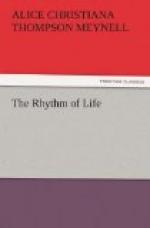Now this fugitive writer has not been so swift but that I have caught him a clout as he went. Yet he will do it again; and those like-minded will assuredly also continue to show how much more completely human, how much more sensitive, how much more responsible, is the art of the critic than the world has ever dreamt till now. And, superior in so much, they will still count their superior weeping as the choicest of their gifts. And Lepidus, who loves to wonder, can have no better subject for his admiration than the pathos of the time. It is bred now of your mud by the operation of your sun. ’Tis a strange serpent; and the tears of it are wet.
THE POINT OF HONOUR
Not without significance is the Spanish nationality of Velasquez. In Spain was the Point put upon Honour; and Velasquez was the first Impressionist. As an Impressionist he claimed, implicity if not explicity, a whole series of delicate trusts in his trustworthiness; he made an appeal to the confidence of his peers; he relied on his own candour and asked that the candid should rely upon him; he kept the chastity of art when other masters were content with its honesty, and when others saved artistic conscience he safeguarded the point of honour. Contemporary masters more or less proved their position, and convinced the world by something of demonstration; the first Impressionist simply asked that his word should be accepted. To those who would not take his word he offers no bond. To those who will, he grants the distinction of a share in his responsibility. Somewhat unrefined, in comparison to his lofty and simple claim to be believed on a suggestion, is the commoner painter’s production of his credentials, his appeal to the sanctions of ordinary experience,




